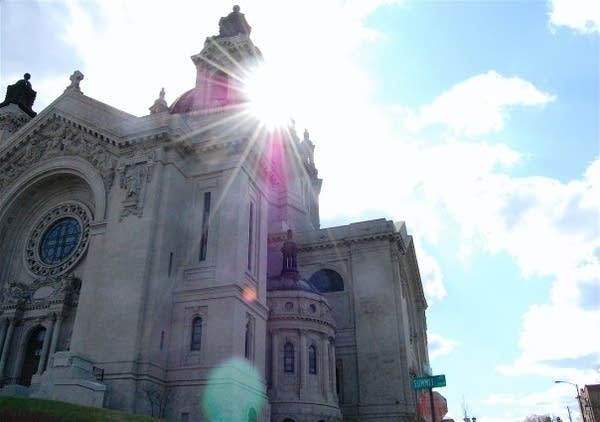Pope's resignation surprises Minn. Catholics

People woke up Monday to news that no one has heard for six centuries.
Pope Benedict XVI's surprise decision to step down for health reasons prompted both disappointment and hope among the Catholic faithful in Minnesota. But many said they're not ready yet to judge his eight years as pontiff.
Helen Mary Hughesdon counts herself among those very surprised by the pope's plan to resign. He was the first pope to resign since Pope Gregory XII in 1415. Hughesdon found out at morning Mass in the basement chapel at the Cathedral of St. Paul.
"Bit of a surprise is an understatement," she said.
Create a More Connected Minnesota
MPR News is your trusted resource for the news you need. With your support, MPR News brings accessible, courageous journalism and authentic conversation to everyone - free of paywalls and barriers. Your gift makes a difference.
Hughesdon, though, said she thinks Pope Benedict leaves an important legacy, by easing restrictions on traditional Latin Mass — known in the church as the extraordinary form.
"Instead of emphasizing the divide that that was the old church, this is the new church, I think he emphasized this is all one church," Hughesdon said. "It's possible to have two different rites."

Others, like Bemidji parishioner Hank Krigbaum, said they're grateful to Benedict's attention to contemporary issues, some of them particularly relevant to Minnesota.
"I'm very much of a pro-life individual, and I felt comfortable with his support of where the church is coming from. And I think that along with his support of the definition of marriage in the church, those are issues that are very important to me," Krigbaum said. "I think he has led us very well there."
Others, though, say they aren't disappointed to see Benedict go.
"I think we could use a change. And hopefully it will be in a little more liberal vein," said Audrey Schweitzer, who was at Mass in St. Paul Monday morning.
She said she'd like to see another pontiff like Pope John XXIII, who called the Second Vatican Council that modernized the church.
"I would like so see someone who is not afraid of change, who is more open to hearing what the people have to say, and maybe dealing with things as they are now, rather than things that are old," she said.

Parishioners weren't the only ones caught off-guard. Rev. John F. Kinney, Bishop of the St. Cloud Diocese, said the news came as a "complete surprise."
"It is important for us to remember at a moment like this that indeed the Holy Spirit is in charge," Kinney said in a statement. "From my own personal experience of diminishment, I fully understand [Benedict's] decision and applaud his courage in making it."
John Nienstedt, the Archbishop of Minneapolis-St. Paul, issued a statement Monday, noting he'd met with the Pope last March. He said the resignation was a surprise, but said, "I am saddened by the thought of losing his strong leadership for the church."
A HISTORIC TURN?
Some critics of the church say they suspect the pope's resignation was in part a response to doubts about his handling of the mounting evidence of sex abuse scandals.
"They deal with it today and in this papacy the same way they did in the 14th century," said Jeffrey Anderson, an attorney in St. Paul who has sued the church repeatedly — including the Vatican — over child sex abuse by clergy.
"It's that adherence with the past that's got them out of date and out of step," Anderson said. "A resignation under these circumstances, to me signals perhaps a step out of the 18th century, perhaps into the 20th century, and perhaps someday into the 21st."
Catholic theologians say that may be reading too much into the situation, although the dean of the school of theology and the seminary at St. John's University, William Cahoy, agrees it's a historic turn for the church.
"Pope Benedict was known as a traditionalist in many ways. And this is a highly untraditional thing to do," Cahoy said. "Just the whole idea of a kind of a monarchic understanding. It's more of a life than a job you do for a term."
But many Catholics also noted that they think it will take years to know what that change means, and what Benedict's legacy will be.
